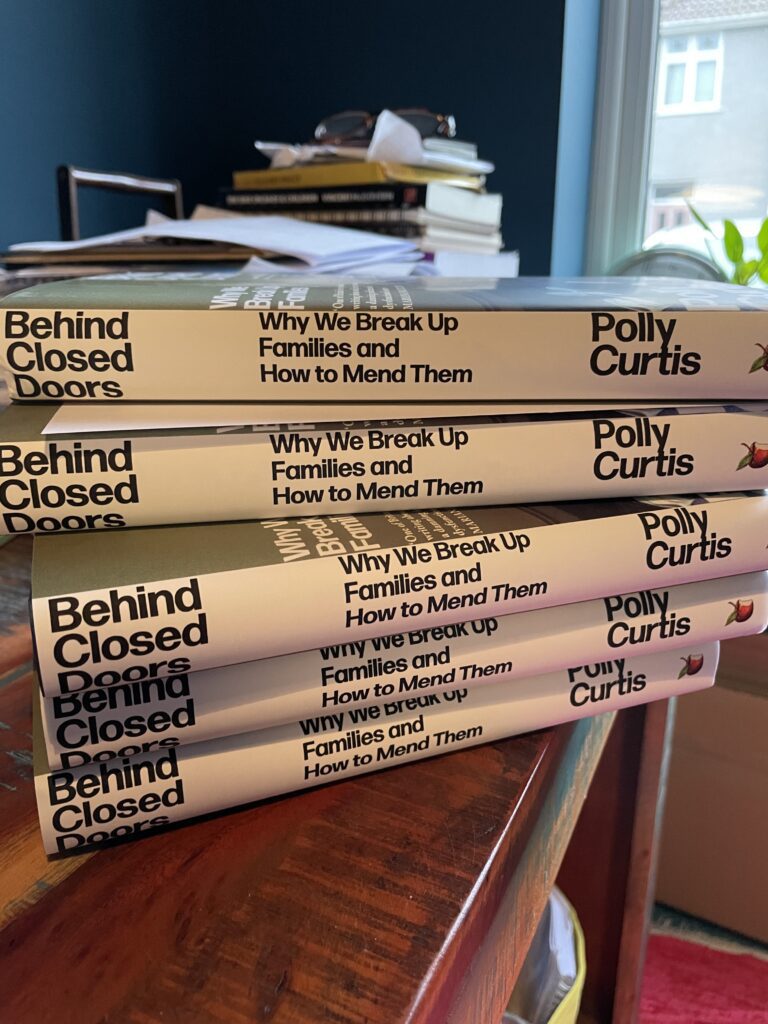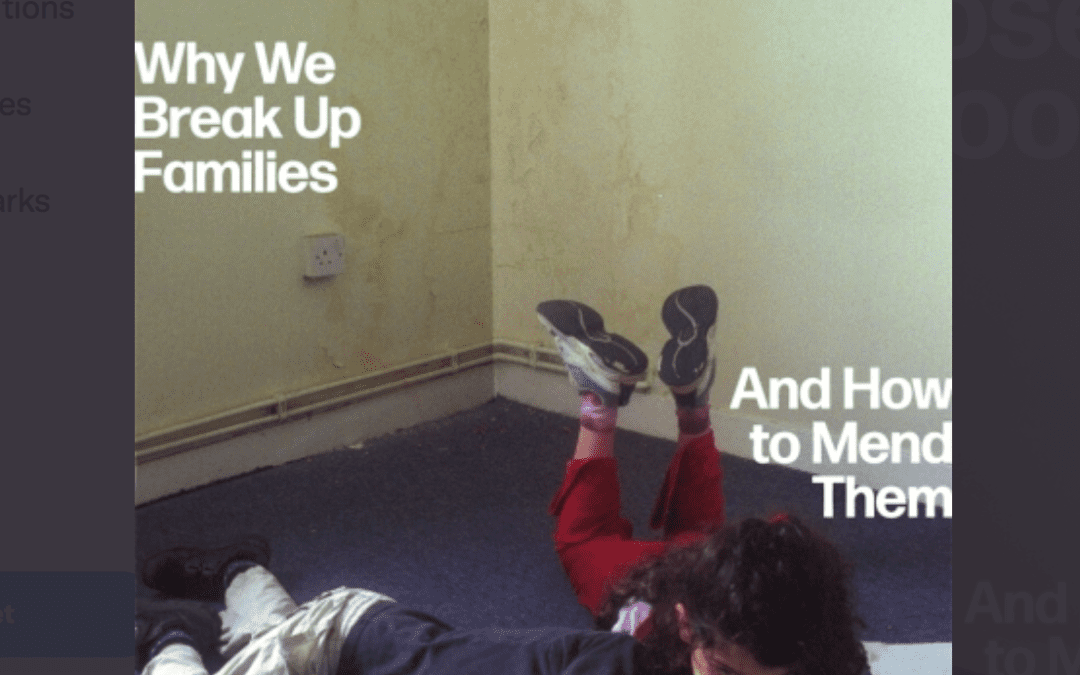Behind Closed Doors: Why we break up families – and how to mend them, is due for publication by Virago on February 3. Here the Author, Polly Curtis, answers our questions.
What’s your book, Behind Closed Doors, about?
It’s about how the decision is made to remove a child from their family, and why we are removing so many children and yet still missing some of the most vulnerable. Each chapter tells the story from a different perspective in the system: the mother, the father, the child, the foster carer, the social worker, the lawyer, the teacher and the judge. Through these multiple perspectives I hope the reader will understand the complexity of what’s going wrong – despite all the best efforts of so many of the professionals involved. When I put together all the stories I’d heard with the evidence in the data and research, I found not only huge variation in how child protection works, but evidence of unfair treatment of certain groups and people within the system. I found that we are now removing children before we have done everything as a state and society to support families to stay safely together. That feels so wrong. And I look at some potential solutions based on properly investing in social work and the wider family network to help protect family ties.
How did you get into this subject?
I’m a journalist and was asked to look into the subject by Tortoise Media, a slow news organisation dedicated to deep investigative reporting. I became more and more fascinated by this issue because of the individual stories within it, but also because of the incredible people – from parents and care experienced children, to social workers and legal professionals – trying to improve the system. I also feel it is such a fundamental issue about protecting children, but also protecting family life, and that is so often ignored or oversimplified in the media. I also think it tells a specific story of the breakdown in the relationship and trust between the state and people, which is part of a bigger issue of rising distrust in the authorities and with that, populist governments.
What was your process for writing the book?
I spent a lot of time listening. Tortoise Media does news differently, it mandates its reporters to listen first and has established forums, called ThinkIns, to bring people together to debate and share experiences before the writing starts. So I did a lot of listening to all parties in this story, then more deeply reported some of the stories by spending long periods of time with the people they are about. I wanted to tell the human stories because that’s what people can relate to. I also spoke to academics and other researchers to understand the data and evidence base. I spent long periods in court, witnessing what was happening even if I couldn’t report it. I went to America to see how they’ve changed up the system in New York, reducing the numbers of children in care. I looked at the potential solutions emerging in places like Leeds that have invested in doing social work differently.
What did you change your mind about or understand differently through the course of the research?
I originally started looking at why so many children are going into care and whether there were other alternatives. I quickly understood that there are many children going into care who, if they had the right support, might have been able to stay with either their parents or wider family. But I was struggling to square that with the fact that there are still so many children left in dangerous or neglectful homes for too long. Sometimes these issues are characterised as a binary debate between people who say the system is too interventionist, and others who say it is neglectful and doesn’t save the children who really need help. The appalling cases of Arthur Libinjo-Hughes and Star Hobson last year really highlighted that. But I think now that this is a false debate. Both those scandals – the child removed too soon and the ones left behind – are symptoms of the same problem: an underinvestment in early support and the highest quality social work that isn’t time constrained. We are leaving children in neglectful homes and removing too many. It’s a breathtaking double failure of the state.
What do you want people to understand from it?
I want people to understand the complexity of a failing system – and that it’s a systemic failure rather than a blame game about parents, social workers or the courts. Parents can want to do everything to look after their children – and still not be good enough. Social workers go into their profession with such important hopes and dreams – but aren’t given the tools for success. The courts want to do the right thing – but are being dealt a bad hand. There’s enough blame here already. And I want to contribute to a debate about how we could improve the system, by investing in it properly and equipping it to care for the most vulnerable people in our society not just with process and risk aversion, but with love.
If you are interested in this book :

- Behind Closed Doors: Why we break up families – and how to mend them, is published by Virago on February 3. To order click here. The price to order is £16.99 .
- Polly has kindly provided The Transparency Project with four free copies, for us to give away to readers who are on a low income. If you would like a copy, please email us at info@transparencyproject.org.uk.
- Polly Curtis will be taking part in a Tortoise ThinkIn on February 3 debating the future of social work. Click here and use the code SOCIAL22 to register for free.
Disclosure : our chair, Lucy Reed was interviewed for this book. We haven’t read it yet, but we hope to be able to bring you a review of the book in due course.
Feature Pic: Polly Curtis Behind Closed Doors published by Virago Press 3rd February 2021
We have a small favour to ask!
The Transparency Project is a registered charity in England & Wales run largely by volunteers who also have full-time jobs. We’re working hard to secure extra funding so that we can keep making family justice clearer for all who use the court and work within it.
We’d be really grateful if you were able to help us by making a small one-off (or regular!) donation through our Just Giving page.
Thanks for reading!

It sounds like an interesting read.
As for change, that will be a long and painful road.
Another ‘love will save the system’ advocate who somehow manages to see the ‘good’ in everything and everyone. Sigh. This isn’t going to work. The people who are uneccesarily removing children or leaving them in dangerous homes pay no thought to doing the ‘right thing’. You can’t appeal to their better nature. They have their own agenda and it has nothing whatsoever to do with holding hands and in a circle and and singing kumbaya. It shocks me how so many so called journalists that get a voice these days cannot see the obvious. This woman apparently sat in the court room and witnessed real care proceedings and still believes this. Either the children’s services cartel modified their behavior around Ms Polly or [Edited for legal reasons].
Completely agree!!!
I agree with Sally. Children’s Services can be a law unto their own and nothing a parent does or says will make any difference to their decision in removing a child from their family. Adoption is a first resort in many cases.
Sounds like a good book but again the reason for social workers and social care saying they are there to keep families together and support. Them well that’s a lie it’s all profit for them and foster carers they take children away from loving caring parents and emotionally and mentally break the children and parents down to make profit for themselves cause they have targets to hit to get a bonus at the end of it they say they are doing it in the best interest of a child but they don’t care about children cause if they did they would snatch them away from there parents and place them with strangers who are abusing our children in care